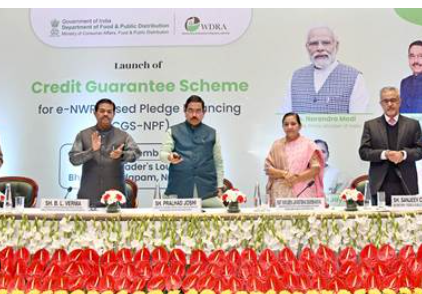New Credit Guarantee Scheme (CGS)
The Government of India has launched a new Credit Guarantee Scheme (CGS) to support small farmers, introduced by Union Food and Consumer Affairs Minister Prahlad Joshi, which allocates ₹1,000 crore to facilitate easier access to loans for small and marginal farmers after harvest.
Purpose of the Scheme
The CGS seeks to prevent distress selling among farmers and allows them to store their produce and obtain loans using electronic warehouse receipts (e-NWRs) as collateral. This system enables farmers to wait for better market prices before selling their crops.
Mechanism of e-NWRs
Electronic warehouse receipts are issued by registered warehouses. These receipts serve as a guarantee for banks, allowing them to lend money to farmers. By using e-NWRs, farmers can secure immediate funding without having to sell their produce at lower prices.
Impact on Agricultural Credit
The scheme aims to enhance access to agricultural credit. Currently, most loans are granted to traders or larger farmers, leaving small farmers at a disadvantage. The CGS is designed to encourage banks to support smaller agricultural operations more effectively.
Minister Joshi emphasised the initiative’s role in promoting sustainable farming practices. He also noted that the government is maintaining low urea prices for farmers, despite the rising costs of global fertilisers, further supporting agricultural sustainability.
Future Goals and Expansion
The current post-harvest lending through e-NWRs stands at ₹4,000 crore, with a potential target of ₹5.5 lakh crore over the next decade. The government plans to improve coordination between banks and warehouses to achieve this goal.
Efforts will focus on educating farmers about pledge financing. The government aims to simplify processes on platforms like e-Kisan Upaj Nidhi and increase the number of registered warehouses, which currently number 5,800.
GKToday Notes:
- Credit Guarantee Scheme (CGS): The CGS supports small farmers by providing ₹1,000 crore for easier loan access. It aims to prevent distress selling and enhance agricultural sustainability.
- Electronic Warehouse Receipts (e-NWRs): e-NWRs serve as collateral for loans. They are issued by registered warehouses, allowing farmers to secure funding without immediate sales at low prices.
- e-Kisan Upaj Nidhi: e-Kisan Upaj Nidhi is a platform aimed at simplifying agricultural financing. It focuses on educating farmers about pledge financing and improving access to loans.
Month: Current Affairs - December, 2024
Category: Agriculture Current Affairs









Hussain Ahmed Laskar
December 22, 2024 at 10:04 pmMujhe fabrication ka business karne ke liye loan chahie tha iske liye mujhe kya proof Dena hoga mujhe jyada se jyada 3 lakh rupaye ka loan chahie aur mujhe business mein tarah jyada invest karna hai mere pass itna amount nahin hai isliye main loan ke liye TRAI kar raha tha mujhe loan nahin mil raha hai kya mujhe yahin se loan mil sakta hai